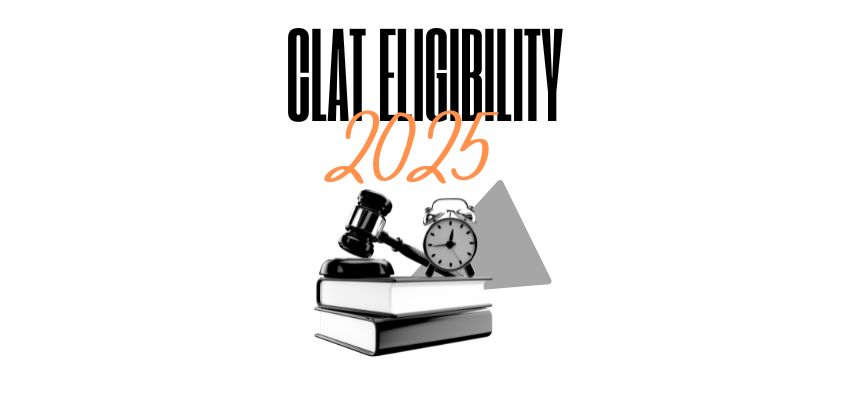+91 9990898327
Office : 632, Dr. Mukherjee Nagar, Delhi 110009
Mon-Sun: 09:00AM - 08:00PM

Common Law Admission Test (CLAT) is a national-level entrance test conducted by a consortium of NLU. CLAT allows you to secure admission into the prestigious National Law Universities that are considered the top law schools in the country, apart from other private law schools that also accept the score. Through CLAT, you can get admission into five-year LLB and LLM programs.
Eligibility criteria for CLAT are essential in determining who can apply for the exam. Understanding the eligibility criteria ensures that only those candidates who meet the requirements apply for the exam. Furthermore, it helps maintain fairness and equality among aspirants.
You should have completed your 10+2 or equivalent examination from a recognized board/university.
You should have a minimum of 50% in LLB or any equivalent degree from a recognized university.
There is no upper age limit for appearing for CLAT.
As per last year’s notification, Indian Nationals, Non-Resident Indians (NRIs), Overseas Citizens of India (OCIs), Persons of Indian Origin (PIOs), and Foreign Nationals are eligible for CLAT.
There is no specific subject requirement for enrolling in undergraduate programs, but applicants must have studied law as a compulsory subject for postgraduate programs.
For those belonging to the General/OBC/PWD/NRI/PIO/OC categories, you must secure at least 45% marks in the 10+2 Board Examination.
For those belonging to SC/ST categories, you must secure at least 40% marks in the 10+2 Board Examination.
Postgraduate Programs
For those belonging to the General/OBC/PWD/NRI/PIO/OC categories, you must secure at least 50% marks in LLB or equivalent degree.
For those belonging to SC/ST categories, you must secure at least 45% marks in LLB or equivalent degree.
There is no upper limit for candidates appearing for CLAT.
NRI/Foreign Nationals can apply for CLAT if they meet the specific requirements of the participating NLUs.
Undergraduate Program
Must secure at least 45% marks in the class 12th board exams.
Postgraduate Program
Must secure at least 50% marks in LLB or equivalent degree.
Undergraduate Program
Must secure at least 40% marks in the class 12th board exams.
Postgraduate Program
Must secure at least 45% marks in LLB or equivalent degree.
Undergraduate Program
Must secure at least 45% marks in the class 12th board exams.
Postgraduate Program
Must secure at least 50% marks in LLB or equivalent degree.
Undergraduate Program
Must secure at least 45% marks in the class 12th board exams.
Postgraduate Program
Must secure at least 50% marks in LLB or equivalent degree.
Undergraduate Program
Must secure at least 45% marks in the class 12th board exams.
Postgraduate Program
Must secure at least 50% marks in LLB or equivalent degree.
CLAT eligibility criteria are based on age, nationality, and educational qualification.
Candidates must meet the eligibility requirements to ensure their admission to NLUs is considered even if they clear CLAT.
Preparing necessary documents beforehand ensures a smooth admission process, especially for NRI/NRI-sponsored students.
If you have any doubts about eligibility, read the guidelines thoroughly or contact CLAT authorities.
To save effort, double-check the eligibility criteria before applying. The eligibility criteria is a little complicated for other than Indian applicants.
CLAT UG aspirants must have completed their 10+2 with a minimum of 45% marks (40% for SC/ST aspirants), and CLAT PG aspirants must have completed their LLB degree or equivalent degree with a minimum of 50% marks (45% for SC/ST aspirants).
CLAT is a prerequisite for getting admission into the law programs at the prestigious National Law Universities. You must satisfy the eligibility requirements provided by the consortium of NLUs to appear for the exam. This blog gives you an overview of the minimum requirements for applying and appearing in CLAT. May you clear CLAT with flying colors!
Yes, foreign nationals are eligible to take the CLAT exam.
Yes, the eligibility criteria differ for undergraduate and postgraduate CLAT programs.
Yes, persons with disabilities (PWD) can apply for CLAT. CLAT examiners provide need-based assistance to such candidates, and they are also entitled to an additional 40 minutes for the exam.
Yes, you can appear for CLAT in the final year of graduation. However, you must submit your final year mark sheet at admission.
Post a comment